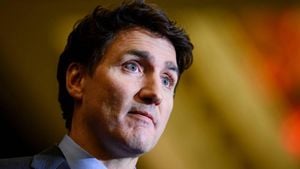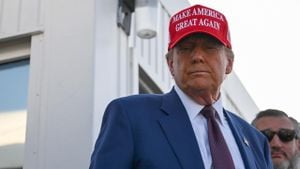Namibia is on the brink of making history as citizens prepare to vote for their first-ever female president. Vice-President Netumbo Nandi-Ndaitwah, representing the ruling South West Africa People's Organization (SWAPO), is vying for the position as the country heads to the polls this week. If successful, she will join the ranks of Africa’s few female heads of state, alongside Tanzania's Samia Suluhu Hassan, who currently holds the distinction as the continent's only female president, having ascended to the role through constitutional succession rather than public vote.
It was 1990 when Namibia gained independence from apartheid South Africa, and since then, SWAPO has dominated the political arena. This upcoming election is particularly momentous, as it might signal not just a highly competitive race but also potential shifts away from the traditional party structures—a trend seen across southern Africa. Voter sentiment is rife with disillusionment, influenced by widespread unemployment and perceived government corruption.
Nandi-Ndaitwah, 72, has deep roots within SWAPO, having joined the party at the young age of 14 as part of the resistance against South African colonial rule. Throughout her political career, she has held numerous ministerial positions including foreign affairs and tourism. Her extensive experience underlines her reputation as a pragmatic and hands-on leader, leading many to trust her capabilities to address the nation’s pressing issues.
Recent polling indicates she has significant support among key demographics, especially those affiliated with the military and diplomatic missions abroad. Conversely, Nandi-Ndaitwah faces stiff competition from Panduleni Itula, the candidate from the Independent Patriots for Change (IPC). Itula, once affiliated with SWAPO before his expulsion, has gained traction among younger voters eager for change. Since making waves with his bold challenges against incumbent leadership during the last election, the IPC has emerged as a credible alternative, reflecting rising anti-incumbency sentiment.
Unemployment rates hover around 19%, chronic economic stagnation poses serious challenges to SWAPO as it seeks to maintain its grip on power. Political analyst Henning Melber describes this moment as potentially the most precarious for the party since Namibia’s independence. Voter demographics are shifting, with approximately half of the registered voters being under the age of 35, many of whom are impatient for tangible improvements to their economic conditions.
The stakes are high for both candidates. Should Nandi-Ndaitwah ascend to the presidency, she would not only make history but could also inspire confidence among women across Namibia and beyond, urging increased participation from females in political leadership roles. Yet, she also carries the weight of the legacy of SWAPO, which is struggling to redefine itself amid challenges of their long-standing rule.
Itula's campaign is characterized by charisma and promises of reform, placing him as the face of change amid frustrations with the status quo. His style sharply contrasts with Nandi-Ndaitwah's approach, which emphasizes unity and patience. The race is intensifying, making headlines and drawing attention from international observers eager to see how Namibia navigates this pivotal election.
With nearly 1.4 million registered voters participating, the outcome will reveal not just the future leadership of Namibia but also the fate of political structures established post-independence. There’s speculation about the potential for the election results to require a runoff—a first for Namibia—if neither candidate secures more than 50% of the votes cast. This could amplify the power struggle within the ruling party, which is already under pressure.
The imminent election is not merely about individual candidates but encapsulates broader themes of democracy, change, and the pursuit of gender equality within the political sphere. Citizens are told they hold the power as they head to the polls, potentially reshaping the future of their country with their votes.
The elections will occur under the scrutiny of both local and international observers, all watching to see if Namibia will truly elect its first female leader, establishing not just historical precedence but possibly setting the stage for more empowered female leadership throughout Africa.
On the eve of these elections, the atmosphere is electric with anticipation, uncertainty, and hope. Namibian voters are taking their seats at the forefront of history. The candidates prepare for what’s expected to be the most competitive race since independence, each carrying the hopes of different segments of society. The world watches as Namibia stands poised on the brink of change, with the results of this election promising to reverberate far beyond its borders.



